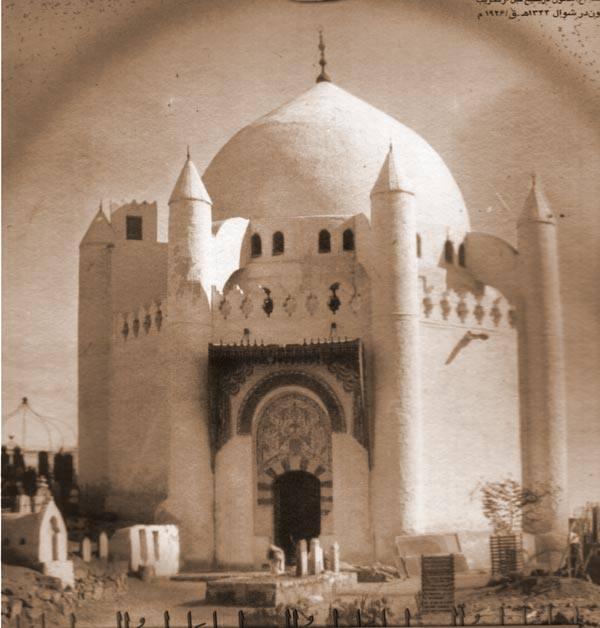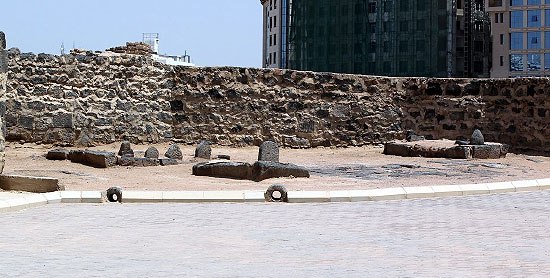I was just thinking ,'Now wouldn't it be nice if someone could communicate some information to the gaurds or 'religious police' and give them a diferent point of view'.
I cam up with this letter.Here it is:
To the Institution for Education at Jannat ul Baqi,
I cam up with this letter.Here it is:
To the Institution for Education at Jannat ul Baqi,
All praise be to Allah, who is the Lord of the worlds. The Lord of our souls. The Master of our fate.
You are standing at a very holy place. You may not think so because of your training of the beliefs of Abdul Wahab .who was influenced by Ibn Tayimiyyah’s teachings, who in turn ,followed the teachings of Ibn Hanbal who belonged to the Sunni sect of Islam.Ibn Hanbal was born at least a century and a half after the demise of the Prophet. How can what he preached be called ‘early Islam’? He never even saw the Prophet or witnessed his preachings.
During his life, however, was the reign of the 7thand 8th divinely ordained Imams; Imam Musa Kazim and Imam Ali Raza, peace be on them both. These Imams preached ‘early Islam’yet carried out their mission under strict and very hostile political circumstances. They inherited the divine guidance from the Holy Prophet (peace be upon him and his family) and Hazrat Ali as about whom Prophet Muhammad has said ;’I am the City of Knowledge and Ali is it’s Gate’.
Oh! Gaurds ofJannat ul Baqi! Where you are standing are the kin and progeny of the Holy Prophet; about whom Allah says :
‘Say , O Muhammad! I do not want from you any recompense for my preaching to you except that you should love my kin.’ Chapter Al-Shura (42:23).
It seems the kings of Saudi Arabia, have more respect and importance in the eyes of it’s people than does the Last Prophet of Allah, Peace be upon him and his family. The Kings’ garments ,swords and relics are preserved in museums. While anything connected to the Prophet or his family is being destroyed or already has been.
There is more information on the Royal family than there is on the Prophet of Islam.And the Prophet is
Rahmat ul lil Aalameen;a Mercy unto all creation.
Oh, Saudi guards! You are being paid to do the wrong thing. There is a wealth of knowledge at your feet. Yet you are oblivious to the blessings that are attached to them. Even if you do not believe in Imammate , if you read history you will undoubtedly find them to have possessed incomparable piety and infallibility. Attachment to them is attachment to Allah.
The most important personalities buried here are:
Imam Hassan
Imam Zainul Abideen
Imam Muhammad Bakar
Imam Jafar Sadiq
And possibly
Hazrat Fatima (peace and blessings be on them all)
They were all martyred by the enemies of Allah, the enemies of Islam.Hence, they are still alive.
Allah says, Do not call those who die in the way of Allah as dead. They are alive, but you do not have a sense of that life.
Allah gives them sustenance even though they are buried underground.
Though they are not physically present among us, their sacrifices give life and vitality to our religion. It reminds us of the true purpose of life. It encourages us to make the greatest sacrifices as they have ,to attain closeness to our Creator.
No one can get guidance except by the Will of Allah .Even from the Quran,different people derive different interpretations . .Although, the Quran was revealed to all of humanity, not just muslims. Yet, to some it guides and to others, it causes to stray.
That is why the Prophet has said :
The likeness of my Ahle bait is the Ark of Noah, whoever gets in it ,is saved, whoever doesn’t , drowns.
Only the Ahlebait can explain the hidden meanings of the Quran.
He also said: ‘I am leaving two things behind, the Quran and my Ahle bait .The two will not separate until meeting me at the fountain of Kauther.’
Who was better in the Sunnah of the Prophet than the Ahle bait?
When Allah made Hazrat Adam as, he blew some of His spirit into him.We all have the spirit of Allah inside us.That is what makes us alive.
All praise is due to Allah. Even when I praise a flower, I am praising God. Is that shirk too?Does that mean one is equating a flower with Allah? Or even connecting it with Him.In salah whilst performing sajdah we place our heads on the ground, does that mean we are equating that small area of ground with Allah?
On the day of resurrection we would like the Prophet ‘s blessing.Yet, in this world we are trampling upon his teachings.
The Prophet was the practical Quran in human form .
He has said: ‘I and Ali are of one Divine Light’.
So, Ali is Quran in human form.And then Hassan and Hussain and so on until today our Imam e Asr is the protector of Quran and the Word of Allah and for whom all Muslims and non- muslims are waiting.
Oh! Guards! May Allah guide you to the right path. And may you no longer torture and harass pilgrims who know better than you and who come from faraway lands to pay their respects to the Divine personalities resting there.
Unfortunate are you,who are standing all day at one of the holiest of places yet your thoughts are far removed from any aspect of holiness.
My advice for you all is to find new jobs and rediscover Allah and Islam. Study different points of view .And question what you believe.
Open your mind. Be tolerant of other peoples’ views.
Restudy Abdul Wahab and how he spread his views.And also the life of Hazrat Ali and Nahjul Balagha –his sermons and Imam Zainul Abideen and Sahifa e Sajjadiya-his supplications(who is buried in Jannat ul Baqi).You will be transported into history and will see the difference, God willing.
In the end,I’d like to say there is no compulsion in religion.
As Allah has said : ‘To you your religion, to me my religion’.
MayAllah guide you to the right path and may you discover the true spirit of Islam.
‘Say , O Muhammad! I do not want from you any recompense for my preaching to you except that you should love my kin.’ Chapter Al-Shura (42:23).
It seems the kings of Saudi Arabia, have more respect and importance in the eyes of it’s people than does the Last Prophet of Allah, Peace be upon him and his family. The Kings’ garments ,swords and relics are preserved in museums. While anything connected to the Prophet or his family is being destroyed or already has been.
There is more information on the Royal family than there is on the Prophet of Islam.And the Prophet is
Rahmat ul lil Aalameen;a Mercy unto all creation.
Oh, Saudi guards! You are being paid to do the wrong thing. There is a wealth of knowledge at your feet. Yet you are oblivious to the blessings that are attached to them. Even if you do not believe in Imammate , if you read history you will undoubtedly find them to have possessed incomparable piety and infallibility. Attachment to them is attachment to Allah.
The most important personalities buried here are:
Imam Hassan
Imam Zainul Abideen
Imam Muhammad Bakar
Imam Jafar Sadiq
And possibly
Hazrat Fatima (peace and blessings be on them all)
They were all martyred by the enemies of Allah, the enemies of Islam.Hence, they are still alive.
Allah says, Do not call those who die in the way of Allah as dead. They are alive, but you do not have a sense of that life.
Allah gives them sustenance even though they are buried underground.
Though they are not physically present among us, their sacrifices give life and vitality to our religion. It reminds us of the true purpose of life. It encourages us to make the greatest sacrifices as they have ,to attain closeness to our Creator.
No one can get guidance except by the Will of Allah .Even from the Quran,different people derive different interpretations . .Although, the Quran was revealed to all of humanity, not just muslims. Yet, to some it guides and to others, it causes to stray.
That is why the Prophet has said :
The likeness of my Ahle bait is the Ark of Noah, whoever gets in it ,is saved, whoever doesn’t , drowns.
Only the Ahlebait can explain the hidden meanings of the Quran.
He also said: ‘I am leaving two things behind, the Quran and my Ahle bait .The two will not separate until meeting me at the fountain of Kauther.’
Who was better in the Sunnah of the Prophet than the Ahle bait?
When Allah made Hazrat Adam as, he blew some of His spirit into him.We all have the spirit of Allah inside us.That is what makes us alive.
All praise is due to Allah. Even when I praise a flower, I am praising God. Is that shirk too?Does that mean one is equating a flower with Allah? Or even connecting it with Him.In salah whilst performing sajdah we place our heads on the ground, does that mean we are equating that small area of ground with Allah?
On the day of resurrection we would like the Prophet ‘s blessing.Yet, in this world we are trampling upon his teachings.
The Prophet was the practical Quran in human form .
He has said: ‘I and Ali are of one Divine Light’.
So, Ali is Quran in human form.And then Hassan and Hussain and so on until today our Imam e Asr is the protector of Quran and the Word of Allah and for whom all Muslims and non- muslims are waiting.
Oh! Guards! May Allah guide you to the right path. And may you no longer torture and harass pilgrims who know better than you and who come from faraway lands to pay their respects to the Divine personalities resting there.
Unfortunate are you,who are standing all day at one of the holiest of places yet your thoughts are far removed from any aspect of holiness.
My advice for you all is to find new jobs and rediscover Allah and Islam. Study different points of view .And question what you believe.
Open your mind. Be tolerant of other peoples’ views.
Restudy Abdul Wahab and how he spread his views.And also the life of Hazrat Ali and Nahjul Balagha –his sermons and Imam Zainul Abideen and Sahifa e Sajjadiya-his supplications(who is buried in Jannat ul Baqi).You will be transported into history and will see the difference, God willing.
In the end,I’d like to say there is no compulsion in religion.
As Allah has said : ‘To you your religion, to me my religion’.
MayAllah guide you to the right path and may you discover the true spirit of Islam.















